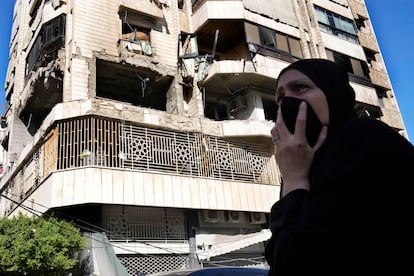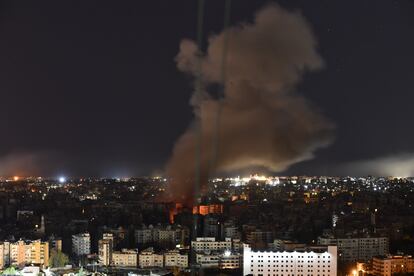Israel launches largest attack on central Beirut and orders new evacuations in the south
The airstrikes, the second against the Lebanese capital during the current offensive, killed at least seven members of a health organization linked to Hezbollah, which launched dozens of missiles and drones against Israeli territory

Mariam Ghuel, 31, has been fleeing the bombs for eleven months without success. On October 11, three days after Hezbollah launched its first shells at Israeli targets and the crossfire on the border began, she fled from Mays al-Yabl, her small town in the southeast that almost touches Israel, to Dahieh, the large Shia suburb of Beirut that she left “on the day they bombed so much,” September 24, when Israeli airstrikes killed 558 people in just a few hours. She ended up in a school converted into a shelter in Bashura, a neighborhood in the heart of Beirut considered safe and not far from the government headquarters. It was there that, around midnight, she heard the bombing of a building a few dozen meters away, the deadliest - with a provisional death toll of seven - of the two attacks that Israel has launched against the Lebanese capital since it began its offensive last month, which is now accompanied by a ground invasion and new evacuation orders.
“I felt safer here than in Dahieh, because I was in a shelter and there was nothing political or military here,” she says, pointing to the hole left by the missile. It was, as the white flags placed on the damaged walls indicate, the headquarters of the Islamic Committee for Health, a charity organisation linked to Hezbollah. The attack killed seven employees and volunteers of the organization.
There were three consecutive strikes, without warning, which caused a black cloud of smoke to rise over the city, as EL PAÍS was able to verify. At street level, the result is a very localized bombing, which barely damaged the other nine floors of the building. Ghuel, however, heard the explosions from the school yard where she takes refuge with her children and thought it was against the school itself. “People started screaming, the children started crying [...] I no longer feel safe here now, but I don’t have any alternatives either. Where do I go? We spend each day not knowing if we will end it alive or dead,” she says.
Imad Hiyazi heard the explosion from even closer range as he lives in the same building and went out into the street in his pyjamas amid the shattered glass and the smoke. He says that the building contains 84 apartments “and in each one there are at least two families,” because “almost all” of them host displaced people from the south. “If we dare to live here and open our doors to other people, it is only because we feel safe, because we know that Hezbollah does not keep a single bullet here. What we found on the ground are not weapons or bullets, but serum and bandages,” he says. This is the same point that Kamal al-Zuhur, a member of the Islamic Committee for Health, insists on: “The victims were people who were responsible for transporting the wounded or sick, and for helping the [hundreds of thousands of] displaced people” from the south, the Beqaa valley, and Dahieh, the areas that have been bombed the most.
Israel has previously launched strikes against ambulances and medics belonging to Hezbollah-linked organizations, considering them to be part of the organization or disguised militiamen. In this case, it has limited itself to reporting a “targeted attack” of which it will provide details at a later date.
In the south, where Ghuel comes from, Israeli soldiers and Hezbollah units have been engaged in fighting since at least Wednesday. The Israel Defense Forces (IDF) lost eight men, its worst day against the Shia militia since the clashes began a year ago. In addition to the capital, Israeli fighter planes are maintaining pressure on militia positions on the southern border. Their main target during the night was a municipal building in the town of Bint Jbeil, about three kilometers (1.8 miles) from the dividing line between the two countries. Hezbollah militants were operating there with “large quantities” of weapons, according to the Israeli army. In the operation, about 15 militia were killed, out of a total of 60 over the last 24 hours, military sources added.

Lebanese army opens fire on Israeli forces
Another of these attacks has generated an unprecedented situation in almost a year of crossfire between Israel and Hezbollah. The Lebanese army, which remains on the sidelines of the clashes, announced Thursday that it had opened fire on Israeli forces after two of its soldiers were killed in shelling during the day. In a statement, the Lebanese Armed Forces claim to have fired at the source of the attack that killed one of their men, in a barracks in the region of Bint Jbeil, near the border. The Israeli army has not commented on the incident.
A Lebanese army soldier was also killed in an Israeli air strike while working on an evacuation and rescue mission with the Lebanese Red Cross in the southern town of Tayba. The Red Cross said in a statement that it “always” coordinates its movements with the UN mission in Lebanon, UNIFIL (which passes information to Israel) and reported that four of its volunteers were wounded.
Meanwhile, Hezbollah continues to launch dozens of missiles and drones towards Israeli territory, where air raid sirens have been sounding since early Thursday in anticipation of possible impacts. One of these drones was intercepted over the sea near Nahariyya, about six miles from the border, and another fell without causing damage or casualties, according to military sources.
Replicating the strategy implemented in Gaza, where the vast majority of the 2.3 million inhabitants have been expelled from their homes, the Israeli army has warned the inhabitants of more than 20 towns in southern Lebanon to evacuate because these localities are considered a war zone, according to a statement. This is something Israel has already carried out in other areas in recent weeks.
“Evacuate your homes immediately. Be careful, you must not go south. Any southward movement may put you in danger,” Israeli military spokesman Avichay Adraee warned, giving details of the instructions on the social network X. “The IDF does not intend to harm you, and for your own safety, you must evacuate your homes immediately and head north of the Awali River. Save your lives.”
On Thursday, Israel announced the deaths of three Hamas leaders in Gaza, who were allegedly killed in an attack in the north of the enclave three months ago. Among them was Ruhi Mashtaha, head of the government of the fundamentalist group in the Strip and whom Israel considered one of the men closest to Yahya Sinwar, the mastermind of the October 7 attacks on Israel and the new leader of the movement, following the assassination of Ismail Haniyeh in July in Tehran. “Hamas did not announce their deaths, as it has done after other previous eliminations, in order to avoid a loss of morale,” the statement said.
Sign up for our weekly newsletter to get more English-language news coverage from EL PAÍS USA Edition
Tu suscripción se está usando en otro dispositivo
¿Quieres añadir otro usuario a tu suscripción?
Si continúas leyendo en este dispositivo, no se podrá leer en el otro.
FlechaTu suscripción se está usando en otro dispositivo y solo puedes acceder a EL PAÍS desde un dispositivo a la vez.
Si quieres compartir tu cuenta, cambia tu suscripción a la modalidad Premium, así podrás añadir otro usuario. Cada uno accederá con su propia cuenta de email, lo que os permitirá personalizar vuestra experiencia en EL PAÍS.
¿Tienes una suscripción de empresa? Accede aquí para contratar más cuentas.
En el caso de no saber quién está usando tu cuenta, te recomendamos cambiar tu contraseña aquí.
Si decides continuar compartiendo tu cuenta, este mensaje se mostrará en tu dispositivo y en el de la otra persona que está usando tu cuenta de forma indefinida, afectando a tu experiencia de lectura. Puedes consultar aquí los términos y condiciones de la suscripción digital.








































